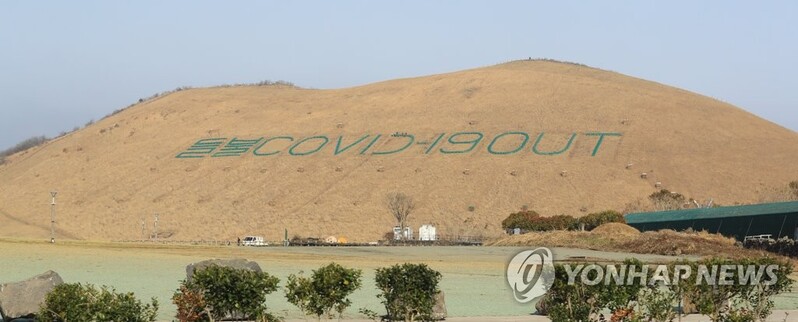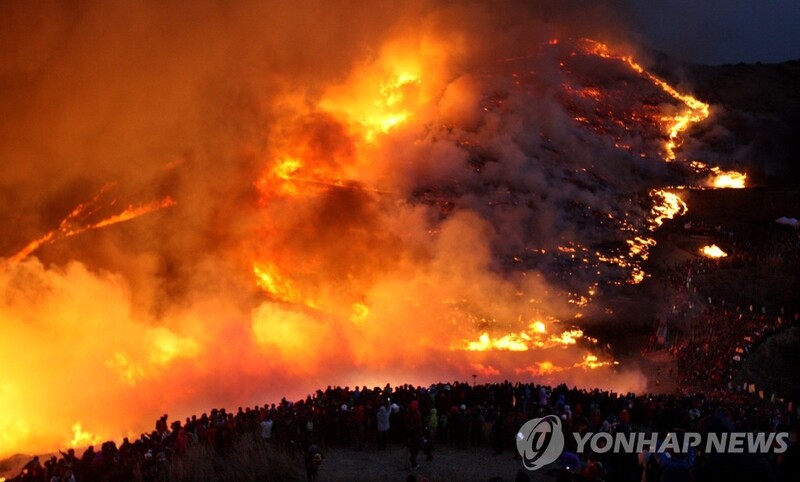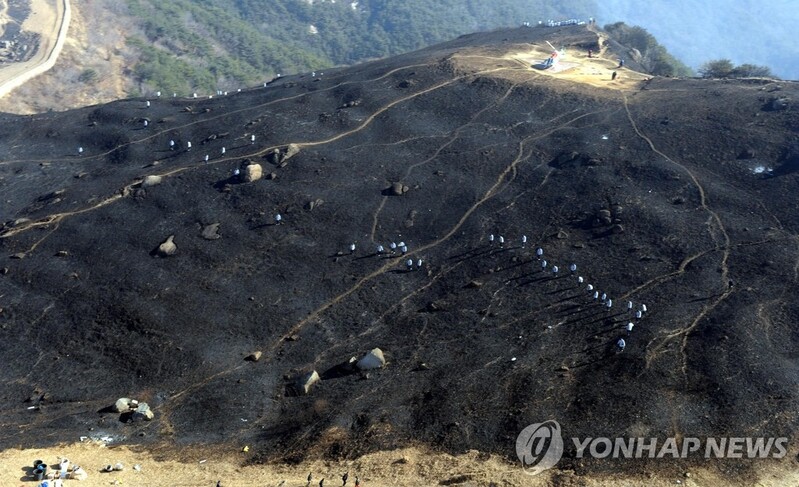by Yun Ji Hyun / Cha Min Kyung
[ENG] Jeju Wildfire Festival
 |
| ▲ This photo provided by Jeju City shows a scene from the Jeju Wildfire Festival in 2017. (PHOTO NOT FOR SALE) (Yonhap) |
The Wildfire Festival is a modern reinterpretation of a tradition held in the inland mountainous region of Jeju.
In the inland village of Jeju, where cattle farming was prevalent, a fire was set during the late winter to early spring in the fields to renew the greens and remove pests from mountain grasses in ancient times.
This event is also known as "Bangae" in Jeju.
The act of setting wildfire in specific refers to Jeju's customs but in a broader perspective, the tradition is similar to the customs of Jwibulnori, which is practiced throughout the Korean Peninsula.
Jwibulnori is a traditional Korean game in which people set fire on the banks of rice fields in rural areas around the fifteenth day of the Lunar New Year. In each village, piles of straws are stacked up on rice paddies and they burn weeds and the straws by setting on fire in the evening.
While the name of the Wildfire Festival and Jwibulnori are different, their main purpose is the same. Before farmers officially start to farm, big fires are set on fields or rice fields in order to eliminate pests and allow burnt weeds to become manure.
The act of setting wildfire also has the meaning of wishing good health, well-being, and a good harvest for the year while driving out bad luck as well.
However, it is now difficult to see the Wildfire Festival and Jwibulnori happen in our daily lives as the act of setting fire on mountains have been banned due to the recurring forest fires and the widespread of pesticides.
Instead, local festivals that resemble this motif continue to be popular among people.
◇ Jeju Wildfire Festival
The Jeju Wildfire Festival, which is a modernly revived version of the custom of setting fire in the inland area of Jeju, began in 1997 and marks its 22nd anniversary this year.
Last year, the festival was put on hold due to the COVID-19 outbreak, making the 2021 Jeju Wildfire festival the first festival to be held in two years.
 |
| ▲ Jeju City officials currently preparing for the 2021 Jeju Wildfire Festival that is scheduled to be held on March 13th. The text reads: "Wildfire COVID-19 OUT". |
The biggest task for the festival is setting up a field fire in the special terrain of the inland area of Jeju Island called an "Oreum". Since the festival deals with a huge wildfire, the size of the festival is beyond comparison to Jwibulnori or the Sheaf Burning Full Moon Folk Festival.
This year, the tickets for the festival will be available through a pre-booking system and the festival itself will be held online in order to prevent the spread of the corona virus.
On March 13th at 7 p.m, the lighting event will be broadcasted live around the world through YouTube. At the local site, the festival will be carried out in a drive-in manner where people can sit in their cars and watch the fire.
◇ Controversy over the Jeju Wildfire Festival
In Korea, various festivals with different themes are held regularly to revitalize local tourism and the wildfire festival, which began in Jeju in the 2000s, has spread to various areas as well.
Around this time the Changnyeong County held the Hwawang Mountain Burning Festival while in Hanam City, located in Gyeonggi-do, held the "Jeongwol Daeboreum Wildfire Festival"; both of which have been controversial and now suspended.
In 2009, a fire set for the festival spread to forest fires, leading to a major disaster that ultimately killed four people.
 |
| ▲ On Feb.9th, during a wildfire festival in Changnyeong County, the fire spread to the summit of the Hwawang mountain causing a number of casualties in 2009. (PHOTO NOT FOR SALE) (Yonhap) |
 |
| ▲ The summit of the Hwawangsan mountain covered with black ashes after the forest fire. A total of four people were found dead and 60 were injured from this incident. (PHOTO NOT FOR SALE) (Yonhap) |
In the same year, the Hanam City Festival was criticized for burning down the field of Misa-ri, the largest migratory bird destination in the Seoul metropolitan area.
The Jeju Wildfire Festival, which resumed this year, is also considered to revive traditional culture and help the local economy. However, it is still being criticized for its possible risks of spreading the corona virus.
(END)
(C) Yonhap News Agency. All Rights Reserved













![[가요소식] 르세라핌 '퍼펙트 나이트' 스포티파이 5억 스트리밍](https://korean-vibe.com/news/data/20260201/yna1065624915999052_337.jpg)









![[동정] 오세훈 시장, 서울영화센터 찾아 단편영화 관람](https://korean-vibe.com/news/data/20260131/yna1065624915998775_686_thum.jpg)